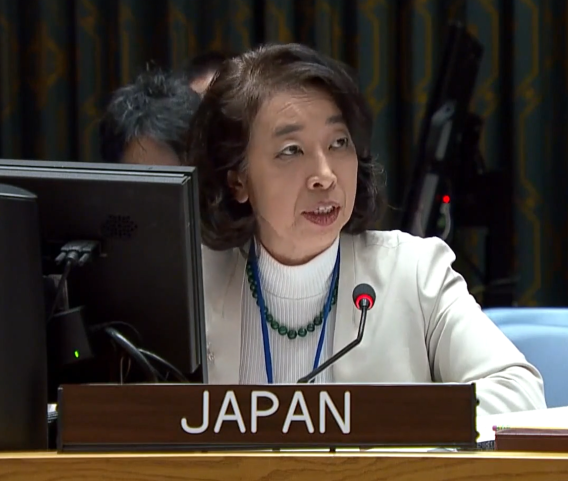ウクライナ人道状況に関する安保理会合における志野大使ステートメント
令和5年3月17日

Mr. President,
I thank Mr. Griffiths for his briefing.
Regretfully, Russia's aggression against Ukraine in a clear violation of international law persists, despite widespread calls to halt it on its one-year anniversary last month.
Russia's unlawful aggression has worsened the humanitarian situation in Ukraine and the world at large, which is deplorable.
Mr. President,
The humanitarian crisis has worsened in 2023, with 222 million people in 53 countries unsure if they will have access to food. About one million individuals in developing countries face extreme hunger. Russia's aggression against Ukraine has damaged the global food supply and worsened the humanitarian situation.
In these times of precarious global food supplies, the role of the Black Sea Grain Initiative has become more critical than ever before.
The initiative has enabled the exportation of 24 million metric tons of grain from Ukrainian ports and over 1,600 secure vessel voyages through the Black Sea, with 55 per cent of food exports going to developing countries. The initiative has been indispensable in decreasing the worldwide cost of food and provided vital assistance to those who have been significantly affected by this war, particularly in developing countries.
Japan commends the Secretary-General and his team including Mr. Griffiths’ relentless efforts, along with Ms. Grinspan’s efforts, to safeguard the continuity and the integrity of this initiative by engaging with the parties, including the visit to Ukraine and the meeting with the Russian Deputy Foreign Minister.
Japan strongly supports an automatic extension of the Black Sea Grain Initiative for the same period and its further expansion, and urges involved parties to collaborate in that regard.
Mr. President,
Russia's aggression has severely harmed Ukraine's agricultural sector, accounting for 10% of its GDP and 25% of exports. It is vital to restore Ukraine's agricultural production capacity, not only for economic stability but also to boost global food supply. Last week, Japan gave sunflower and corn seeds to 400 smallholder farmers in Kharkiv, prioritizing women and young farmers, where agricultural production and farm income have decreased due to the war.
In addition to the already committed 200 million USD to improve global food security after Russia's aggression last June, Japan decided to provide 50 million USD in food-related aid to countries in need in Asia, the Middle East, Africa, and Ukraine.
The suffering in Ukraine and its ramifications for global food security must come to an end, and Japan reaffirms its unwavering commitment to providing the utmost support and standing in solidarity with the people of Ukraine. Japan, on its part, will continue to actively pursue efforts to secure global food supply, thereby contributing to the maintenance of international peace and security.
Thank you.
